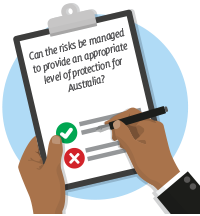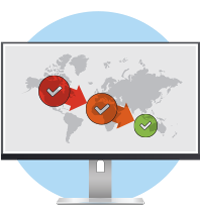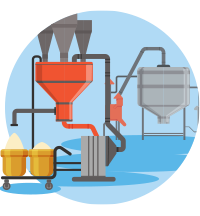Government and industry share responsibility for managing the biosecurity risk associated with importing processed plant-based animal feed into Australia.
Find out how:
- to apply for a permit
- we assess the risks before issuing a permit
- we manage the biosecurity risks of your goods upon arrival in Australia.
You will be charged additional fees where our assessment of your application takes longer than three hours or if a desk and/or site audit is required. See our assessment fees and charges.
[expand all]
Step 1: Apply for a permit

You must apply for a permit to import processed plant-based animal feed into Australia.
To apply, you need to:
- ask the manufacturer to complete our production questionnaire
- submit the completed questionnaire with your permit application in the BICON system.
Step 2: Assessing the application

When we receive your application, we will:
- review the production questionnaire and assess whether the proposed manufacturing, storage and transportation processes minimise the associated biosecurity risks to provide the appropriate level of protection for Australia. We may ask you to provide further information for the assessment
- decide if a desk audit or on-site verification audit or both are required. We will ask you for approval first. Find out when we audit.
If a site audit is required, we will let you know if it can be conducted by a third party auditor. Learn more about engaging a third party auditor.
Step 3: Desk audit

You will need to ask the manufacturer and any other overseas facility that manufactures, store, handles, transport and/or exports the product, to complete our plant-based animal feed audit questionnaire .
We will assess the information provided against our requirements to ensure the biosecurity risks are mitigated at every step along the import pathway.
Any non-conformances identified must be addressed to our requirements before proceeding further.
We will then either:
- finalise and make a decision about the application (go to step 5)
- proceed to a site audit.
Step 4: Site audit

A site audit is undertaken to confirm the findings of the desk audit and verify that the biosecurity risks are mitigated to an acceptable level before export. This involves reviewing the facility’s processes and records, and inspecting as necessary the farm production, manufacturing, storage, and transport.
The site audit will be undertaken by us or a third party we have approved.
Step 5: Application decision

Depending what we find in our biosecurity assessments, we will either grant or refuse to issue a permit.
We may also refuse to grant a permit if we have insufficient information for our assessment.
Any fees paid are non-refundable.
Step 6: Arrival of the goods in Australia

Upon arrival of the goods in Australia, we will:
- check your import permit and consignment documentation. Where valid documentation is not supplied we will hold the consignment until the correct paperwork can be provided
- inspect the goods for live insects and plant and animal biosecurity risk material. Where biosecurity risk material is found we will send it for assessment. We may also collect samples for testing
- depending on what we find at inspection, the goods are either released to the importer, or they are treated, exported, or destroyed.
Download the infographic
Department of Agriculture, Water and the Environment, September 2020
| Document |
Pages |
File size |
|---|---|---|
|
1 |
667 KB |
If you have difficulty accessing this file, visit web accessibility for assistance.

